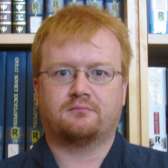
"Bulgaria’s “Internal Others:” Jews, Turks, and Pomaks, 1934-1944"
Professional Background
Professor James Frusetta earned a Ph.D. in European history at the University of Maryland, an M.A. in European history at Arizona State University, and a B.A. in history and international relations at the University of Southern California. During his fellowship, he was Visiting Professor at the College of William and Mary. For his Charles H. Revson Foundation Fellowship for Archival Research, Professor Frusetta conducted research for his project, “Bulgaria’s ‘Internal Others:’ Jews, Turks, and Pomaks, 1934-1944.”
Professor Frusetta is the author of several articles and book chapters, including with Anca Glont, “Death Squads of the Forces of Light: Terrorism and Self-Sacrifice in the Legion of the Archangel Michael,” The Fourteenth International Round Table: Terrorism, Intellectualism, Balkan Troubles; “Cookie Pushers and Bomb Throwers: Interwar American Foreign Policy and Perceptions of the Balkans,” Ètudes Balkaniques, XXXIX:4 (2004); and “Divided Heroes, Common Claims: IMRO Between Macedonia and Bulgaria,” in John Lampe and Mark Mazower, eds, Ideologies and National Identities: The Case of Twentieth-Century Southeastern Europe (Budapest: Central European University Press, 2003). Professor Frusetta is also the recipient of several awards for his accomplishments in teaching and research, including the Phi Beta Delta award for commitment and excellence in encouraging international education; Fulbright-Hayes Graduate Fellowship for Bulgaria; Boren Fellowship for Bulgaria; IREX Southeastern European Area Studies Development Grant; and Prang Prize in European History from the University of Maryland.
Fellowship Research
During his tenure at the Center, Professor Frusetta studied state policy-makers’ vision of Bulgaria and the threat posed by the Jews, Pomaks, and Turks who lived in Bulgaria; the elite and general population’s perceptions of ethnic characteristics; and the concept of Bulgaria as an “opportunistic” state in regards to domestic minority policies. He analyzed Bulgaria’s wartime treatment of Jews within the larger context of Bulgaria’s treatment of minorities and thus compared the experiences of Jews, Pomaks, and Turks. Professor Frusetta studied the Museum’s archival documents on Bulgaria’s anti-Jewish policies in order to compare the experiences of Bulgaria’s minorities during the Holocaust.
Professor Frusetta was in residence at the Mandel Center from June 1 to September 30, 2007.
